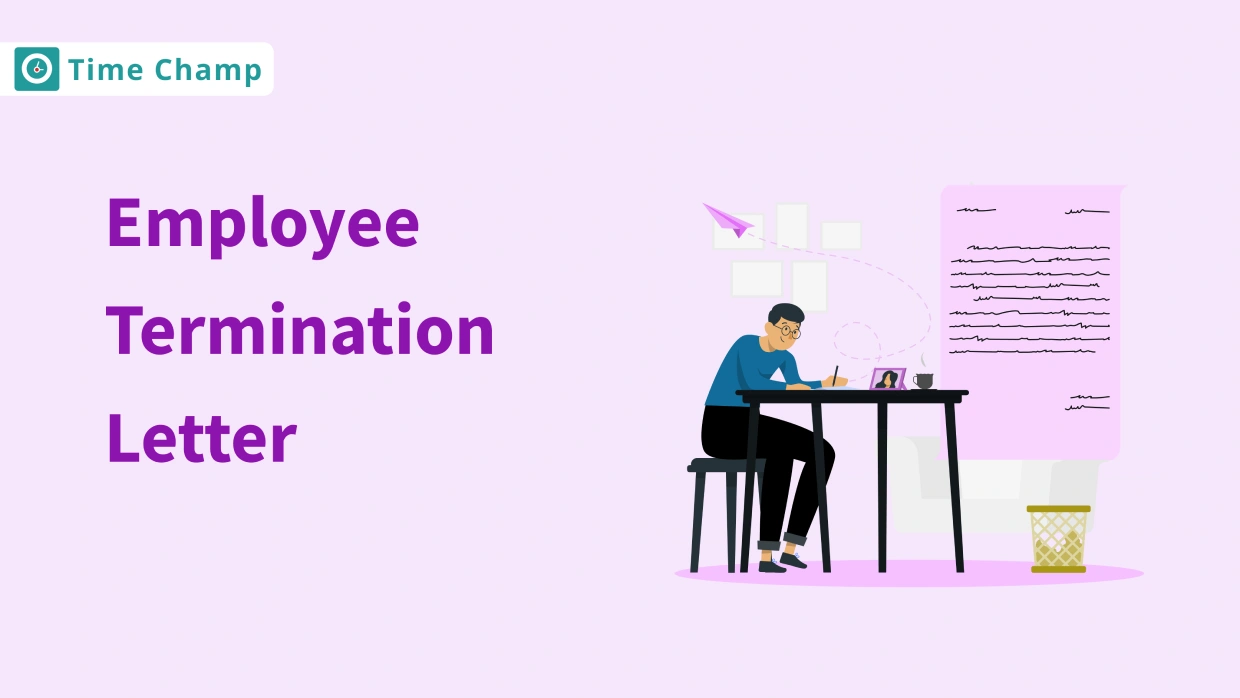It’s not always easy to let someone go, but a nice way to say it can help. With the right termination letter, you can handle the situation better. Having a professionally written termination letter about dismissal provides a clear reason for termination and ensures things are done openly, properly, and legally. It ensures everyone leaves with dignity, avoids confusion, outlines any final compensation and safeguards both the company and the worker.
In this blog, you’ll find 10+ free employee termination letter samples you can use right away, no stress, just ready-to-send templates.
What Is an Employee Termination Letter?
An employee termination letter is a formal document that informs an employee their job is coming to an end. It explains why the termination is happening, the final day and any key points regarding pay, giving back company property and benefits.
Sending this letter makes everything official and lowers the risk of confusion. Whether someone is leaving for performance, company cuts or any other reason, the letter explains everything clearly and respectfully.
Why do Businesses Need an Employee Termination Letter
A termination letter is vital for businesses to communicate about the end of an employee’s job. Here is how:
- It provides a formal reason for ending the employee’s employment.
- Demonstrates that the termination was done in accordance with company guidelines and labor rules.
- Ensures that everyone understands the facts clearly and without mistakes.
- Ensures that termination happens the same way for all departments or cases.
- Maintains fairness and professionalism through all difficult situations.
- It can be used later for the reference or for checking during an audit.
- Provides a professional and considerate way to finish the job or partnership.
Free Termination Letter Samples by Situation
Here are free termination letter templates you can use for different situations. Choose the one you like and tweak it to fit your style.
Termination Letter for Poor Performance
A letter of termination for poor performance is used when an employee does not improve after many warnings and opportunities. The letter makes it clear why the employment is ending, shows examples of performance issues, and politely ends the employee’s time with the company.
How to Format a Resignation Acceptance Email
Subject: Termination of Due to Poor Attendance
Dear [Employee’s Name],
We appreciate the time and effort you have contributed to [Company Name]. After careful consideration, we regret to inform you that your employment will come to an end on [Last Working Day].
This decision follows repeated concerns about your poor attendance, including unexcused absences and frequent tardiness, despite multiple warnings. These issues have affected your performance and team operations.
Please return all company belongings before your last working day to facilitate timely payment processing.
For any queries, contact HR.
We wish you the best in your future journeys.
Sincerely,
[Your Name]
[Your Title]
[Company Name]
Termination Letter for Sample Reason
Subject: Termination of Employment
Dear [Employee Name],
We are grateful for the time and dedication you have given to [Company Name]. After careful consideration, we regret to inform you that your employment will be terminated effective [termination date].
This decision is based on the following reasons:
- Reason 1
- Reason 2
- Reason 3
Please return all company belongings before your last working day to facilitate timely payment processing. Failure to return them may delay your final payment or result in deductions.
We’ll pay any final salary and unused leave as per company rules. If you have questions, please contact HR.
Sincerely,
[Your Name]
[Your Title]
Termination Letter for Violation of Company Policy
A violation of company policy termination letter is given when an employee does not follow company policies or guidelines. The letter explains what policies were broken, lists misconduct and formally terminates the contract without losing professionalism. With documentation, the company acts in a legal way and the employee is clear about the reason for leaving.
Subject: Termination of Employment
Dear [Employee Name],
We sincerely acknowledge the commitment and hard work you've shown during your time at [Company Name]. However, following a thorough evaluation, we must inform you that your employment will be concluded on [termination date] as a result of ongoing violations of company policies.
Additionally, your behavior has not met the standards expected from employees, and you have failed to adhere to safety and security rules, which puts both yourself and others at risk.
Kindly return all company items by your last working day so we can process your final paycheck without delay. Your remaining leave balance and any eligible final payments will be handled as per our company policy.
If you have any questions, feel free to reach out to HR.
Sincerely,
[Your Name]
[Your Title]
Termination Letter for Company Closure
If a company is about to shut down or one of its branches, then employees will need to be let go. A final letter for employee closure clarifies why the company is closing, gives the last date workers should attend and lists payment, severance and benefits details. It reminds employees that the decision was not directly about them, so they can all move ahead with respect and clarity.
Subject: Termination of Employment Due to Company Closure
Dear [Employee’s Name],
Thank you for the time and effort you’ve dedicated to [Company Name]. After careful consideration, we regret to inform you that your employment with [Company Name] will be terminated effective [last working day, e.g., June 30, 2025], due to the closure of our company operations.
This decision was not based on your performance but rather the result of financial and strategic challenges that have made it unsustainable for us to continue our business activities. We deeply appreciate your dedication and contributions during your time with us.
Your final paycheck will include any outstanding wages and unused leave as per company policy. If severance is applicable, it will be provided according to our compensation plan. Please return any company property before your final day.
For any queries, contact HR. We thank you once again and wish you success in your future career.
Sincerely,
[Your Name]
[Your Position]
[Company Name]
[Contact Information]
Termination Letter for Probationary Period Failure
If standards of performance or conduct are not met during the probation period, employers may end the employment of that person. A termination letter is used to formally tell an employee that they have failed during their probation. It makes the reason for the termination clear, confirms when it will happen, and ensures the process stays respectful.
Subject: End of Employment During Probation Period
Dear [Employee’s Name],
Thank you for your contributions since joining [Company Name] on [start date]. As your probationary period comes to an end, we have reviewed your overall performance and behavior during this time.
After careful consideration, we’ve decided not to continue your employment or move forward with a permanent position. Unfortunately, the expectations for your role have not been consistently met, even with feedback and support.
Your last working day will be [termination date]. Please return any company property by then so we can process your final payment, including any remaining leaves if applicable.
We appreciate your time with us and wish you all the best in your future opportunities. If you have any questions or need assistance, please don’t hesitate to contact HR.
Sincerely,
[Your Name]
[Your Title]
[Company Name]
[Contact Information]
Mutual Employment Termination Arrangement
A Mutual Employment Termination Arrangement is when both the employer and employee agree to end the job together, without conflict. This can happen for reasons like the employee seeking new opportunities, company budget cuts, skill mismatches, personal matters, or to avoid disputes and end the work relationship on good terms.
Subject: Mutual Termination of Employment
Dear [Employee’s Name],
After an open and respectful discussion, we have mutually agreed to end your employment with [Company Name], effective [last working day, e.g., June 30, 2025].
We believe that it’s the right move for both you and the company at this stage. Your efforts and professionalism during your time here have been greatly appreciated.
Please return all company property before your last working day. Any final payments, including remaining leave balances, will be handled as per our policies.
We wish you the very best in your next steps. If you need a reference or any assistance, don’t hesitate to reach out.
Sincerely,
[Your Name]
[Your Job Title]
[Company Name]
[Contact Information]
Termination Letter for Performance Improvement Plan (PIP) Failure
If an employee fails to meet the performance needs even after the PIP, a termination letter is sent to them. The PIP is often made as one final attempt to help the employee improve and if the employee does not meet the requirements, it might result in termination. This letter officially announces the end of the process.
Subject: Termination of Employment Following PIP Review
Dear [Employee’s Name],
We appreciate the efforts you’ve made during your Performance Improvement Plan (PIP) period, which began on [start date]. However, after a thorough review, we’ve found that the necessary improvements in your performance have not been met.
As a result, we regret to inform you that your employment with [Company Name] will be ending, effective [termination date].
Please return any company property you have before your final day. You will receive your final paycheck, along with any outstanding benefits or entitlements, as per company policy.
For any queries, contact HR. We wish you all the best in your future opportunities.
Sincerely,
[Your Name]
[Your Title]
[Company Name]
Termination Letter for Job Redundancy
A termination letter for job redundancy is sent when the organization decides an employee’s job is not needed because of restructuring, downsizing or changing operations. This employment should not end due to poor performance, and communication should still be handled carefully, including final payment details and any support needed.
Subject: Termination of Employment Due to Redundancy
Dear [Employee’s Name],
We understand that this news may be difficult, and we want to express our sincere gratitude for your hard work and dedication. We regret to inform you that your role as [Job Title] at [Company Name] is being made redundant, effective [last working day], due to [briefly explain reason, e.g., business restructuring, department closure, etc.].
This decision is not a reflection of your performance, which we truly appreciate. It is the result of company changes aimed at improving overall efficiency.
Your final paycheck will include any outstanding salary, unused leave, and severance pay, in line with company policy. Please return all company property before your final day.
If you have any questions, feel free to contact the HR team. We thank you for your service and wish you success in your future career.
Sincerely,
[Your Name]
[Your Job Title]
[Contact Information]
Termination Due to Breach of Confidentiality
A termination letter for breach of confidentiality is sent when an employee either reveals, abuses or fails to safeguard important company information. Such a letter states the nature of the offense and confirms that the worker’s employment has been terminated right away.
Subject: Termination of Employment Due to Breach of Confidentiality
Dear [Employee’s Name],
We are writing to inform you that your employment with [Company Name] will be terminated effective [termination date], due to a serious violation of our confidentiality policy.
After an internal review, it was found that you disclosed sensitive company information without authorization. This breach goes against our company’s code of conduct and the confidentiality agreement you signed at the time of your joining.
As a result, we are ending your employment with immediate effect. Your final paycheck, including any earned leave or dues, will be processed in accordance with company policy. Please return all company property by [date].
If you have any questions regarding this decision or the exit process, please contact the HR department.
Sincerely,
[Your Name]
[Your Job Title]
[Company Name]
[Contact Information]
Immediate Termination Notice
An Immediate Termination Notice is a formal letter that ends an employee’s job on the spot due to serious misconduct, such as theft, harassment, or major policy violations. It ensures the company takes quick action to protect its staff, property, and work environment.
When immediate termination is necessary, the employee is typically required to leave on the same day the notice is issued, and the decision takes effect immediately.
Subject: Immediate Termination of Employment
Dear [Employee’s Name],
This letter serves as formal notice that your employment with [Company Name] is terminated effective immediately as of [today’s date].
This action is being taken due to [briefly state the reason, e.g., serious misconduct, violation of company policies, or unauthorized behavior], which has resulted in the loss of trust and a breach of company standards.
Please return all company property (including ID badges, equipment, and documents) to the HR department by the end of the day. Your final paycheck, along with any entitled benefits or leave payouts, will be processed according to company policy.
If you have any questions or need further clarification, please contact HR at [HR contact details].
We wish you the best moving forward.
Sincerely,
[Your Name]
[Your Job Title]
[Company Name]
[Contact Information]
Termination Sample for Not Reaching Job Expectations
This type of letter is sent when someone in the team continues to not meet the necessary job standards, even after getting feedback, help or sufficient time to improve. The purpose of the letter is to tell the employee about the decision, explain what was not met, and finish the working relationship with respect.
Subject: Termination of Employment
Dear [Employee’s Name],
We appreciate the effort you’ve put into your role at [Company Name] since your start on [Start Date]. However, after multiple reviews and discussions regarding your performance, we’ve concluded that your work does not meet the expectations required for your position as [Job Title].
Despite our attempts to support your improvement in areas such as [e.g., meeting deadlines, task accuracy, communication], there hasn’t been sufficient progress. As a result, your employment with us will end effective [Last Working Day].
Please return all company property before your final day. HR will contact you regarding your final paycheck and any remaining benefits.
We thank you for your time with us and wish you the best in your future endeavors.
Sincerely,
[Your Name]
[Your Job Title]
[Company Name]
[Contact Information]
Tips for Writing an Effective Termination Letter
A clear letter prevents confusion for both parties, protects the company, and makes things clear for the employee.
These tips will help you prepare a termination letter that is polite, safe from legal issues and simple for everyone involved.
- Keep your language simple so that people do not misunderstand what you mean.
- State facts about performance or policy problems using evidence.
- Stay polite and professional at all times in your letter.
- Be sure to mention the employee’s final day, their last pay and what benefits they receive.
- Don’t make accusations or say things that could hurt someone’s feelings.
- Look through the letter to make sure all the information and grammar is correct and it agrees with HR policies.
Conclusion
Firing an employee is difficult, but the right letter can help a lot. These 10+ employee termination letter samples help you address various situations with respect and professionalism. If the termination happens for any sudden reasons, these templates help you ensure you’re being clear, lawful and fair for both your business and the worker.
Frequently Asked Questions
A termination letters have the following:
1. Employee’s name and job title.
2. When the employment contract ends.
3. Reason for termination (optional).
4. Outline any problems or issues that have already been noted.
5. Information about employee’s last pay and the benefits included.
6. Instructions for returning the company’s belongings.
7. Someone to talk to if you have more questions.
It’s best to mention it either during the meeting or right afterwards. Clarity is best achieved by meeting in person, but email or certified mail are fine if you can’t meet. It’s important to give notice according to company policy so that there are no misunderstandings.
An employer issues a termination letter to end a person’s job because of how they performed, their behavior or due to layoffs. Employees write a resignation letter when they decide to leave their job by choice.
The way you write should be:
- Use a businesslike tone in your emails.
- Make your communication clear and understandable.
- No matter what happens, continue to be respectful.
- Make sure not to use words that sound emotional, accusing or negative.
While they can’t fully protect you, they can still help. A letter with clear explanations, applying the same policy regularly and documenting any history helps the company if a case is taken to court. It confirms that the end of employment and done correctly.
Here are Some Related Articles You may Find Interesting

What is the Average Salary in Bangladesh: Overview & Insights
Discover The Average Salary in Bangladesh and outsourcing impact. Learn why it’s a rising player in global outsourcing.

Average Salary in India: Factors and Comprehensive Comparison
Discover the key factors influencing the average salary in India across industries, regions, and job levels, as well as insights.

What is the Average Salary in Colombia? & Factors Affecting
Discover the average salary in Colombia and explore the key factors affecting earnings, including industries, experience, and location. Find out.

What is the Average Salary in Indonesia?
Discover the average salary in South Africa and explore outsourcing trends. Learn key insights into wages, industries, and business opportunities.

What is the Average Salary in Hong Kong? and It’s Statistics
Learn about the average salary in Hong Kong, from minimum wage to maximum salaries, and gain insights into industry variations.

What is the Average Salary in Singapore: Economic Outlook
Discover the average salary in Singapore, key factors affecting income, insights into the nation’s economic outlook & explore its trends.



